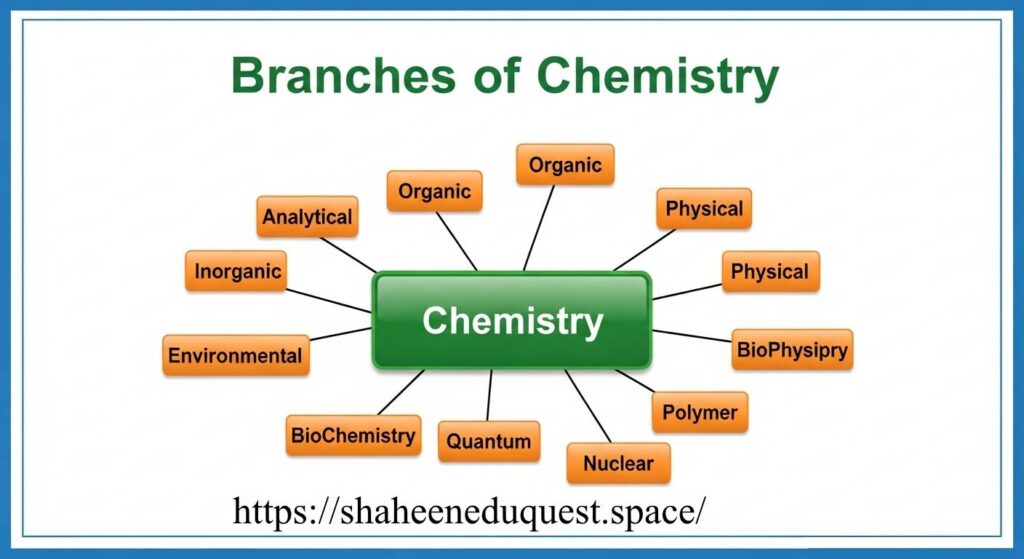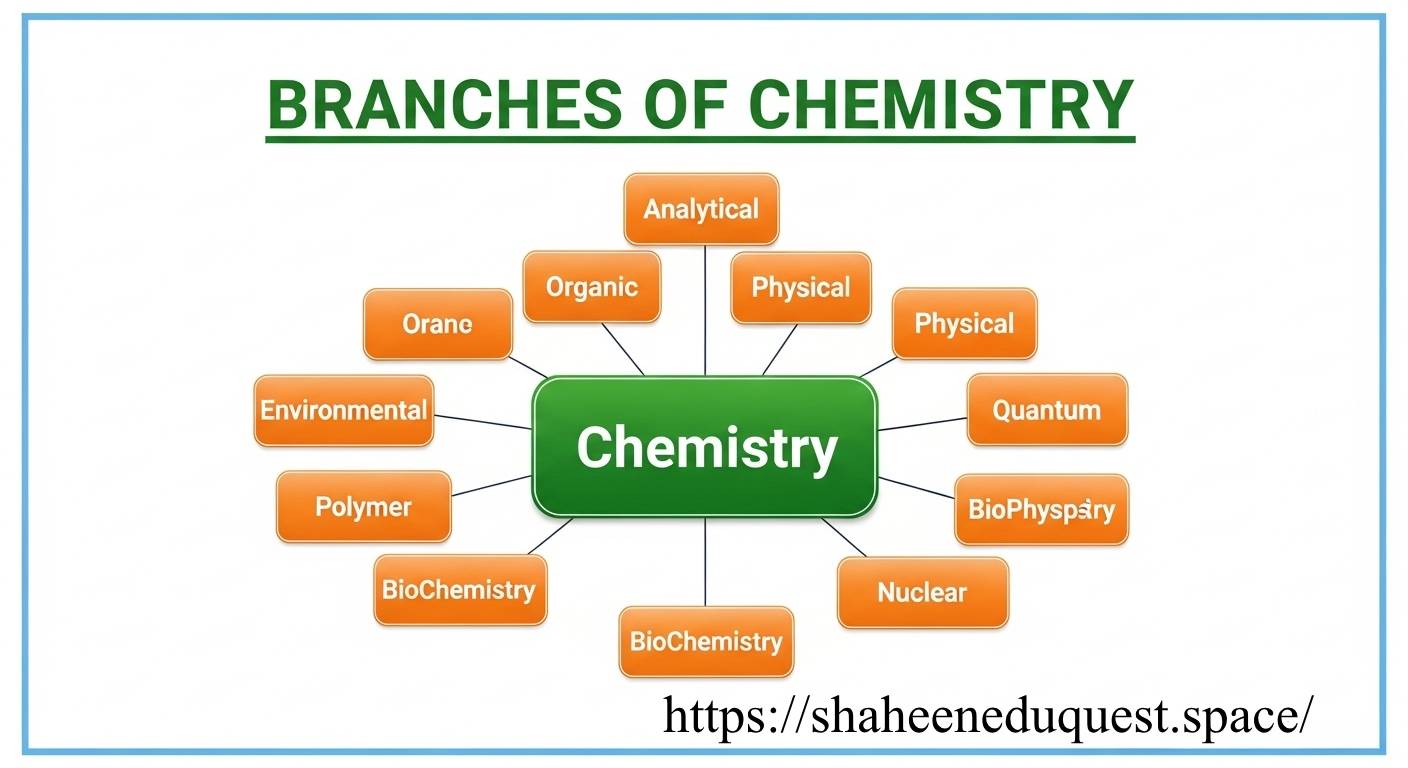“A complete guide to the types of chemistry! Learn about analytical, organic, inorganic, biochemistry, physical, and many other chemical disciplines and their real-world uses.”
Table of Contents
Exploring the Diverse Types of Chemistry: A Journey Through Chemical Disciplines
Chemistry, often dubbed the “central science,” is a vast and fascinating field. It delves into the composition, structure, properties, and reactions of matter. From the intricate processes within living organisms to the fundamental building blocks of the universe, chemistry is everywhere. Understanding the different types of chemistry is essential for appreciating its immense scope and impact on our world.
This article embarks on a journey through the major branches and sub-disciplines of this incredible science. Each area represents a specialized approach to solving complex problems and unraveling the mysteries of matter. By exploring these diverse types of chemistry, we gain insight into how chemists contribute to medicine, technology, environmental protection, and countless other fields.
1. Analytical Chemistry: The Science of What’s There
Analytical chemistry is one of the most fundamental types of chemistry. It focuses on identifying and quantifying the chemical components of substances. Essentially, it answers the questions: “What is it?” and “How much of it is there?”
This discipline employs a wide array of laboratory techniques and instruments. These methods can range from simple titrations to highly sophisticated spectroscopic and chromatographic techniques. Analytical chemists develop new methods to measure chemicals and interpret complex data.
Its applications are incredibly broad. Analytical chemistry is vital in quality control in manufacturing, environmental monitoring (detecting pollutants), forensic science (analyzing evidence), and clinical analysis (diagnosing diseases). Without precise analytical data, many other scientific fields would be severely hampered.
2. Organic Chemistry: The Chemistry of Life
Organic chemistry is the study of carbon-containing compounds. Carbon’s unique ability to form stable bonds with itself and many other elements leads to an enormous diversity of molecules. This makes it one of the most expansive and complex types of chemistry.
These carbon-based molecules form the basis of all known life. Proteins, DNA, carbohydrates, and lipids are all organic compounds. Organic chemists synthesize new compounds and study their structures, properties, and reactions.
The applications of organic chemistry are ubiquitous. It is foundational to the pharmaceutical industry (developing new drugs), the petrochemical industry (fuels and plastics), and the textile industry. Understanding organic reactions allows for the creation of new materials with specific desired properties.
3. Inorganic Chemistry: Beyond Carbon’s Realm
Inorganic chemistry is essentially the study of compounds that do not predominantly contain carbon-hydrogen bonds. This branch primarily deals with metals, minerals, and organometallic compounds (which contain metal-carbon bonds, bridging the gap with organic chemistry).
Inorganic chemists investigate the synthesis, structure, and properties of these compounds. They explore how these substances behave and react, often under extreme conditions. Their work frequently involves materials with unique electronic, magnetic, or optical properties.
This field has critical applications in catalysis (speeding up chemical reactions), materials science (semiconductors, ceramics), environmental chemistry (water treatment), and biochemistry (metal ions in biological systems). Many industrial processes rely heavily on principles derived from inorganic chemistry.
4. Physical Chemistry: Bridging Chemistry and Physics
Physical chemistry is a hybrid discipline that applies principles of physics to the study of chemical systems. It explores the fundamental physical laws that govern chemical processes. This includes understanding energy, force, time, and how they relate to molecular behavior.
This branch uses concepts such as thermodynamics, quantum mechanics, and kinetics. Physical chemists study reaction rates, energy changes during reactions, and the properties of matter at the atomic and molecular level. They often develop theoretical models and computational methods.
The insights from physical chemistry are crucial for understanding molecular interactions, designing new materials, and optimizing chemical reactions. It provides the theoretical framework necessary for advancements in fields like nanotechnology and solid-state physics. It’s one of the most intellectually challenging types of chemistry.

5. Biochemistry: The Chemistry of Living Systems
Biochemistry is the study of chemical processes within and relating to living organisms. It bridges biology and chemistry, unraveling the complex molecular mechanisms that underpin life. This is a rapidly growing and incredibly vital area among the types of chemistry.
Biochemists investigate the structure and function of biomolecules like proteins, nucleic acids (DNA and RNA), carbohydrates, and lipids. They study metabolic pathways, enzyme kinetics, and how chemical signals are transmitted within cells. Genetic engineering and molecular biology are closely intertwined with biochemistry.
Its applications are vast and transformative. Biochemistry is fundamental to medicine (understanding diseases, drug discovery), agriculture (crop improvement), and biotechnology (developing new diagnostic tools and therapies). It provides insights into everything from aging to disease progression.
6. Environmental Chemistry: Chemistry of Our Planet
Environmental chemistry focuses on the chemical phenomena that occur in natural systems, as well as the impact of human activities on these systems. It studies the sources, reactions, transport, effects, and fates of chemical species in the air, soil, and water environments.
Environmental chemists investigate issues like air pollution (smog formation, acid rain), water contamination (heavy metals, pesticides), and soil degradation. They also research solutions, such as waste treatment, remediation technologies, and sustainable practices.
This field is critical for developing policies to protect the environment and human health. It informs efforts in pollution control, climate change mitigation, and resource management. Understanding these chemical interactions is key to preserving our planet for future generations. It’s one of the most socially relevant types of chemistry.
7. Polymer Chemistry: The World of Macromolecules
Polymer chemistry is the study of polymers, which are large molecules (macromolecules) made up of repeating smaller units called monomers. Plastics, rubbers, and many biological materials like proteins and DNA are polymers.
Polymer chemists investigate the synthesis, structure, properties, and applications of these fascinating materials. They develop new types of polymers with enhanced strength, flexibility, heat resistance, or biodegradability for specific uses.
The impact of polymer chemistry is immense, as polymers are ubiquitous in modern life. They are found in packaging, textiles, automotive parts, medical devices, and electronics. This branch continues to innovate, creating smart polymers and sustainable alternatives.
8. Materials Chemistry: Designing the Future
Materials chemistry is an interdisciplinary field focused on the design, synthesis, and characterization of new materials with specific properties. It combines principles from solid-state chemistry, polymer chemistry, and physical chemistry.
Materials chemists work with a vast array of materials, including metals, ceramics, polymers, composites, and nanomaterials. They aim to create materials with novel electronic, optical, mechanical, or catalytic properties for advanced applications.
This field drives innovation in numerous sectors, including electronics (semiconductors, superconductors), energy (batteries, solar cells), aerospace, and biomedicine (biocompatible implants). The development of new materials is often the bottleneck in technological progress.
9. Nuclear Chemistry: Unveiling the Atom’s Core
Nuclear chemistry is the study of radioactivity, nuclear processes, and properties of atomic nuclei. It investigates nuclear reactions, such as fission and fusion, and the behavior of radioactive isotopes.
Nuclear chemists work with radioactive materials, studying their decay processes, half-lives, and applications. They are involved in the production of radioisotopes for medical imaging and treatment, as well as in nuclear energy and weapons research.
This field is crucial for medical diagnostics (PET scans, radiotherapy), power generation (nuclear reactors), and understanding fundamental particles. It also plays a role in environmental monitoring of radioactive contamination. It’s one of the more specialized and high-impact types of chemistry.
10. Theoretical Chemistry: The Computational Frontier
Theoretical chemistry uses mathematical and computational methods to understand and predict chemical phenomena. It applies fundamental physical laws and quantum mechanics to model molecular structures, reactions, and properties.
Theoretical chemists develop algorithms and software to simulate chemical processes that might be difficult or impossible to study experimentally. They often work closely with experimental chemists to interpret results and guide new research directions.
This branch is essential for drug design, materials discovery, and unraveling complex reaction mechanisms. It allows chemists to explore vast chemical spaces and optimize molecular properties before costly laboratory synthesis.
11. Electrochemistry: The Interface of Electricity and Chemistry
Electrochemistry is the study of chemical reactions that involve electron transfer, which are known as redox (reduction-oxidation) reactions. It investigates the relationship between electrical energy and chemical change.
Electrochemists study phenomena like corrosion, battery function, fuel cells, and electrolysis. They design systems that convert chemical energy into electrical energy (like batteries) or use electrical energy to drive chemical reactions.
Applications are widespread, including energy storage (rechargeable batteries for electric vehicles and grids), electroplating, and sensing (biosensors, pH meters). It’s a critical field for the energy transition and advanced manufacturing.
12. Geochemistry: Chemistry of the Earth
Geochemistry applies chemical principles to understand the Earth’s processes and composition. It studies the distribution and movement of chemical elements in rocks, minerals, soil, water, and the atmosphere.
Geochemists investigate topics such as mineral formation, the cycling of elements through Earth’s systems (carbon cycle, nitrogen cycle), and the chemical evolution of the planet. They also study geological processes relevant to climate change and resource exploration.
This field is important for discovering mineral deposits, managing groundwater resources, understanding volcanic activity, and modeling climate change. It bridges geology and chemistry, offering insights into the Earth’s dynamic systems.
13. Food Chemistry: The Chemistry of What We Eat
Food chemistry is the study of chemical processes and interactions of all biological and non-biological components of foods. It examines how food components change during processing, storage, and cooking, affecting taste, texture, and nutritional value.
Food chemists analyze food composition, develop new food products, and ensure food safety. They investigate food additives, preservatives, flavors, and the chemical reactions that lead to spoilage or desirable qualities.
This discipline is vital for the food industry, public health, and nutrition. It helps improve food quality, extend shelf life, enhance flavor, and ensure that food products are safe and nutritious for consumption. It’s one of the more consumer-facing types of chemistry.
14. Green Chemistry: Sustainable Chemical Practices
Green chemistry is a philosophy and approach to chemical design that aims to minimize or eliminate the use and generation of hazardous substances. It focuses on preventing pollution at the source rather than treating it after it has been created.
Green chemists develop more environmentally friendly synthetic methods, safer solvents, and processes that produce less waste. They design chemicals that are less toxic and degrade into innocuous products after use.
This field is crucial for sustainable development, reducing environmental impact, and promoting safer industrial practices across all chemical sectors. It represents a paradigm shift towards responsible chemical innovation.
15. Supramolecular Chemistry: Beyond the Molecule
Supramolecular chemistry is the study of chemical systems held together by non-covalent intermolecular forces. It focuses on molecular assemblies and the interactions between molecules, rather than the covalent bonds within molecules.
Supramolecular chemists design and synthesize host-guest systems, molecular machines, and self-assembling structures. They investigate how molecules recognize and bind to each other, forming larger, functional aggregates.
This cutting-edge field has potential applications in drug delivery (targeted therapies), sensing (detecting specific molecules), nanotechnology (molecular electronics), and materials science (self-healing materials). It explores the fascinating realm of “chemistry beyond the molecule.”
Conclusion: The Unending Frontiers of Chemistry
The various types of chemistry demonstrate the incredible depth and breadth of this fundamental science. From the vastness of the cosmos to the tiniest biological reactions, chemistry provides the tools and understanding to explore, analyze, and innovate. Each discipline, while specialized, often intersects and collaborates with others, leading to groundbreaking discoveries.
As our world faces new challenges in health, energy, environment, and materials, the role of chemistry becomes ever more critical. The ongoing research and development within these diverse chemical fields promise exciting advancements that will continue to shape our future. Understanding these fundamental types of chemistry is the first step in appreciating the profound impact this science has on every aspect of our lives. Its influence is truly pervasive, underpinning almost every scientific and technological breakthrough.
